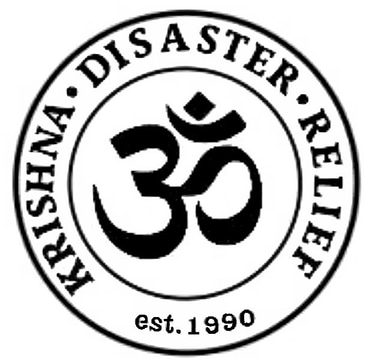Providing FREE vegetarian meals during times of natural disasters

How to Prepare Yourself for
Unforeseen Disasters
On September 24th of last year (2024) I was staying on a small farm in North Carolina that ended up being just minutes away from the enormous destruction brought about by Hurricane Helene when she dumped tons of rainwater on several small communities. As a result we lost all our electricity for 8 days along with no Internet or phone service. What follows are some suggestions on how you can prepare you and your family for an unexpected disaster. Over time more will be added to this list. You are welcome to add to this list, yourself. Just send us an email with your suggestions: (KrishnaDisasterRelief@gmail.com)
"WaterBOB" Bathtub Storage: This is a 100 gallon emergency drinking water container (BPA-Free) that fits inside your bathtub and uses the bathtub faucet to fill it. It comes with hand pump. it is only $34.95 on Amazon. When Hurricane Helene struck we lost power for 8 days. This shut off the electricity to the water well. Unlike us, not everyone had a large generator that saved the day, however, even then it was touch and go because maintenance on the generator had been neglected and only by luck were we able to find a spare spark plug and a kind neighbor who knew how to get it started.
Personally, I was there just visiting and had no idea about the danger and destruction that was about to destroy the 3 communities just down the road. Besides four adults staying at the farm, there were also two cows that needed drinking water. The WaterBob is something that I suggest you consider.
Water containers are also items I suggest you purchase. The 5-gallon size will probably be too heavy to lift when full and is why I suggest the 3-gallon size that you can buy at Walmart. I have 12 of them, full of quality water from our local "water store." Many people in North Carolina did not have water containers, or enough of them. For five days all the local roads were either blocked or washed away, preventing any hope of going to buy water containers and to make matters worse, all the stores were closed because they didn't have electricity. Thankfully we had a very generous neighbor who had a working generator powering their well and they gave us some of their well water until we could get our generator working. However, they did not have any extra containers. The bottom line is that having water-storage containers full of water is essential for your survival. BTW, when finally open, most stores quickly sold out of their water containers (full or empty), so basically there were none for sale.
(Note): I also have about a dozen 1 gallon water bottles filled with tap water that I keep for flushing the toilets. I certainly don't want to be using our quality drinking/cooking water to flush our toilets. So this is another item you need to think about and have on hand.Gasoline was a major issue for many. Although the tank on my Toyota Camry was half full, it should have been completely full. Keeping your gas tank topped off is a good habit to adopt. I also noticed that when stores finally opened, empty gas containers were completely sold out. The same with those propane tanks that you switch out at the store: "Your empty tank for a full one." All of these items were quickly sold out and yet essential during a major disaster.
Cash was another item that I experienced a definite need for. Once we did find a gas station that was open (and had gas to sell) they only accepted cash. I also experienced this at one of the first grocery stores that opened. Although it was a large store, they only allowed 20 people inside at a time and then they, too, only accepted cash. Luckily, since I was on a long trip, I had enough cash with me.
In the trunks of both my Toyota and Jeep I have a backpack that I always have with me. It contains basic first-aid items, extra clothing, extra water, and some nutritional bars. I also have a knife, waterproof matches, etc. More on this later.
Ready.gov is a great place to get all kinds of information on how to plan ahead for disasters.
